The University of Chicago has honored 11 instructors, graduate and undergraduate students for their exceptional work as teachers. Nominated by undergraduates in the College, these winners demonstrated the ability to push students to think beyond the classroom, and to share their disciplines in exciting ways.
Hannah Lant, Thomas Newbold, Alan Parma and Keith Jonathan Ruskin have been awarded the Glenn and Claire Swogger Award for Exemplary Classroom Teaching, which recognizes outstanding teachers with College appointments who introduce students to habits of scholarly thinking, inquiry and engagement in the Core Curriculum—the College’s general education program.
Quan Duong, Casey Ferrara, Taylor Hains and Andrea Reed-Leal have been named the winners of the Wayne C. Booth Prize for Excellence in Teaching, awarded annually to University of Chicago graduate students for outstanding instruction of undergraduates.
And for the first time, three undergraduate teaching assistants have been awarded the College Undergraduate Student Prize in Undergraduate Teaching: Vincent Hou, Liam Pak and Laura Zielinski.
Prize recipients were selected on the basis of nominations from students in the College. The prize itself was established in 1991 in honor of Booth, PhD’50, the late UChicago faculty member who was one of the 20th century’s most influential literary critics.
In addition to the Swogger Award, Booth Prize and Undergraduate Student Prize, five faculty members were recently awarded the Llewellyn John and Harriet Manchester Quantrell Awards.
Learn more about this year’s Swogger Award and Booth Prize recipients below:
Glenn and Claire Swogger Awards
Hannah Lant, Assistant Instructional Professor, Chemistry
Each year, Assistant Instructional Professor Hannah Lant teaches nearly 500 students, and cherishes getting to know each one. An instructor for several courses, including General Chemistry, a capstone lab for majors called “Experimental Physical Chemistry,” and a Core class designed for non-STEM students, Lant said she treats her students as colleagues, and collaborates with them to expand their knowledge and interests.
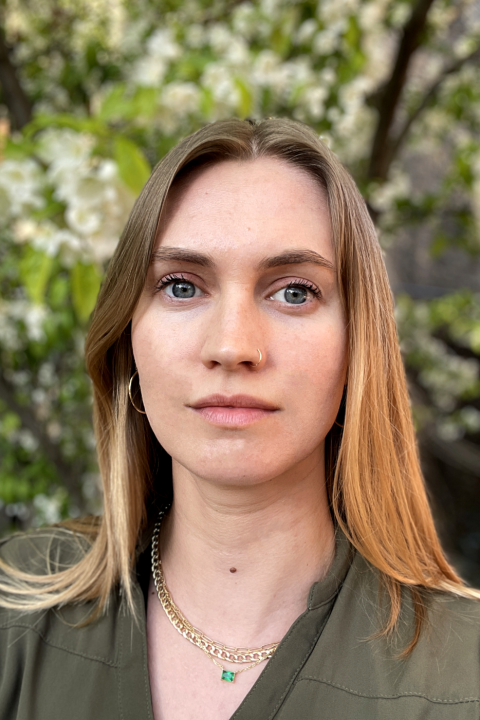
“UChicago students are creative, curious, and resilient, and it is thus a pleasure to work with them,” she said.
The University of Chicago campus is another reason she deeply enjoys her work. Any General Chemistry textbook, Lant explained, will refer to at least several ground-breaking developments in chemistry that took place right here at the university. She appreciates that she can teach in the same setting where these experiments, which helped lead to the modern-day conception of the atom, occurred.
“It’s a wonderful thing to teach students, for example, about the world’s first self-sustaining nuclear chain reaction, and then be able to say, ‘it happened down the street,’” she said.
Whether she is teaching her non-STEM or her Experimental Physical Chemistry students, Lant guides them towards reaching the ever-rewarding ‘Eureka!’ realization. In these moments, she feels her students can most appreciate the challenges of lab work.
At the end of the course, though, it’s the progress that matters most to Lant. She witnesses firsthand her students’ trajectory from tackling the basics of the subject to wading through much more complex ideas of chemistry.
“As a professor, I can show them the road, but they ultimately are the ones to walk the path,” she said. “I like to encourage them on the last day to turn around and see how far they have come.”
Thomas Newbold, Teaching Fellow, Social Sciences Collegiate Division
Though history has always fascinated Thomas Newbold, it wasn't until he was a high school student at an international school in India that he first became interested in what he would now call "the kind of disorienting shock colonial conquest must have been."
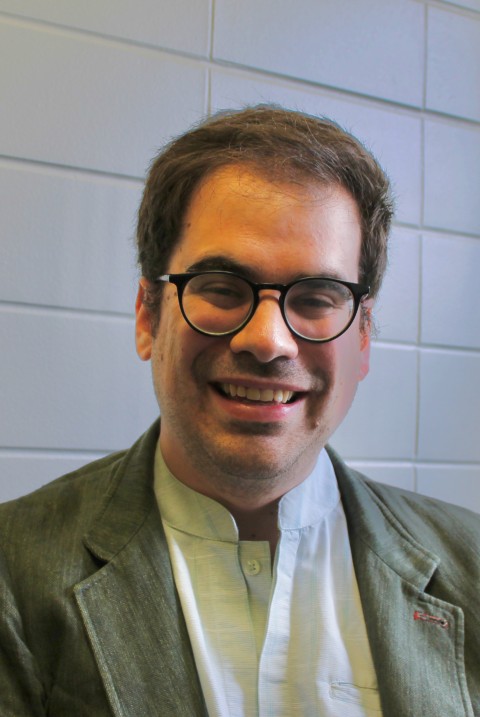
Newbold is now a historian of modern South Asia and the British empire, and oversees a variety of courses covering the history of India and Bangladesh in the colonial period. Currently, he also teaches the Core sequence titled Self, Culture and Society.
He said he finds the University of Chicago to be the perfect place to ask hard questions about temporality and colonialism due to its specific culture of scholarship.
It's no surprise then that many of his courses, from those on colonialism in 19th century India to those in the Core, are centered around interpretations and engagement with primary source readings and archival materials.
Through this process, Newbold hopes his students realize that historical arguments stem from the reconstitutive and interpretative efforts of those who advance them– a task that he hopes they undergo for themselves as students in his class.
One moment that best embodies both Newbold's teaching philosophy and the culture of open inquiry he loves about UChicago occurred in his Self, Culture and Society sequence, when students used propositions from social and political theorists outside of the prescribed curriculum to support their arguments in what he found to be a thoughtful and resourceful way.
"In both the humanities and the social sciences, there is a strong tradition of disciplinary self-reflexivity here," Newbold said, "which is to say, a sense of being part of a tradition of inquiry that first and foremost interrogates itself."
Alan Parma, Assistant Instructional Professor, Romance Languages and Literatures
Language instructor Alan Parma brings a wealth of international experiences to his teaching. Originally from Brazil, Parma taught English before coming to the United States on a Fulbright Scholarship to teach Portuguese, which he now teaches in the College, along with Spanish.
His exposure to second language acquisition research inspired him to pursue a Ph.D. focused on how students best learn new languages. He said he feels very honored to have the opportunity to teach his language and represent his country and culture to the UChicago community.
What sets UChicago apart for Parma is the students’ evident enthusiasm, which helps support a welcoming classroom setting.
“I love the dedication the students demonstrate to the subject matter, this makes classes more engaging and motivates me to do my best for the students,” he said. “I love getting to know my students on a more personable level, and teaching beginning language classes allows me to do so. At the same time, I can share some aspects of my life with my students, which creates a very friendly and open environment.”
One of Parma’s favorite recent moments was when a former student who had studied abroad in Spain visited his office, conversing entirely in Spanish.
“He wanted to show me that one of my students had successfully used Spanish in a Spanish-speaking country. That was a big validation of the work I have been doing,” he said.
Parma said he aims to help his students see the value in their language studies beyond his classroom.
“On the last day of class, I hope my students are able to perceive how much they have grown in their language studies and how much understanding the culture of another country can enhance their lives,” he said.
Keith Jonathan Ruskin, MD, Professor of Anesthesia and Critical Care
Keith Ruskin is a jack of all trades. When he’s not working professionally as an anesthesiologist or teaching medical students and undergraduates in the College, he’s probably doing research for the Federal Aviation Administration on air traffic control alarms.
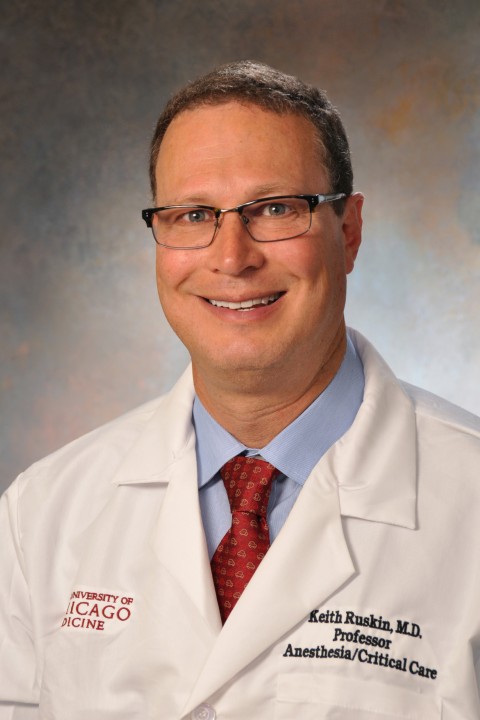
He says the operating room and the aviation environment are not so different – both are high-pressure, life-or-death work environments.
Ruskin, a professor of anesthesia and critical care, says his nontraditional path to medicine informed his varied interests, which in turn inform his teaching approach.
“I went to an engineering school and because of that I tend to approach problems with a different mindset,” Ruskin said. “That applies to my practice of medicine and also to my teaching. Rather than asking students to memorize facts that they’ll forget as soon as the exam is over, I try to get them to learn concepts through classroom discussion. I then ask them to apply those concepts to solve clinical problems.”
In addition to teaching medical students and residents, Ruskin teaches undergraduates in a class called “Conquest of Pain.” The course covers pain physiology and anesthetic mechanisms.
He said he treats his undergraduates just like he does his medical students and residents, as colleagues who are at an earlier stage in their careers. In his course, there are no tests, only reflective essays based on students’ interests, which allows undergraduates to pursue complicated medical issues of interest.
Ruskin said something that makes UChicago different from other universities is that its undergraduate campus and medical center are connected, meaning he is able to teach students at all levels. This also makes site visits possible, allowing undergraduates to see the concepts they are learning about put into practice, which Ruskin says is one of his favorite parts of the course.
“I bring the students into the operating room with me to see me in my ‘day job,’” Ruskin said. “They always enjoy meeting the patients and seeing how surgery, anesthesia, and pain management are actually done.”
Wayne C. Booth Prizes
Quan Duong, Chemistry
As a TA for Organic Chemistry, one of the ways Quan Duong has taught his students is through a simple analogy: Legos. The comparison, he explains, helps them to “play” with the molecules and keeps the subject from getting dry.
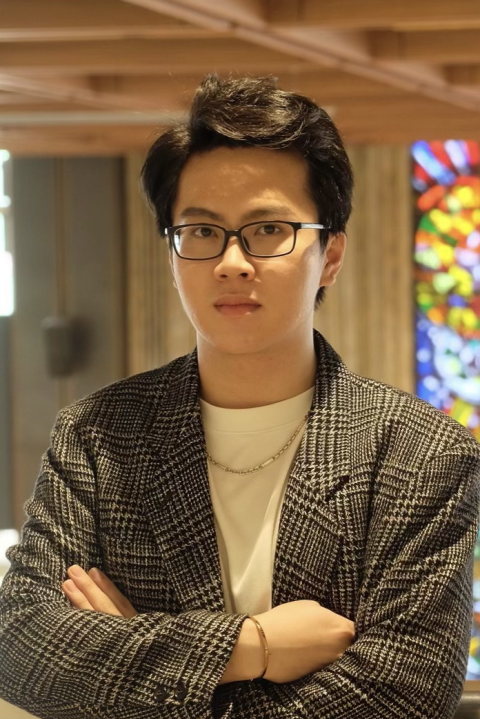
“By encouraging them to manipulate and combine these molecular Legos, they find joy in learning and thus remember reactions more effectively,” he said. “It transforms the classroom into a dynamic space filled with enthusiasm and discovery.”
Aside from his work teaching students, Duong also works in chemical biology. Incited by his fascination with DNA, he has researched gene editing, hoping to help discover solutions to molecular diseases. He specializes in mitochondrial DNA editing—a field that may hold the answer to revolutionizing human health in the future.
Duong’s time as a TA has given him many memorable experiences. He recalled a panicked evacuation due to the spilled liquid of a broken thermometer—it was mistaken as mercury, but fortunately it was just alcohol.
He said he has enjoyed conversations with students, during which they often share their most brilliant insights and strongest concerns. He attributes much of his approach to teaching to advice he received from a senior teaching assistant.
“Remember your own days as a student,” he said. “The challenges were real, and so was the pressure. Empathize with your students rather than placing unrealistic expectations on them.”
Duong said that if he could give his students a lasting message, it would be to continue their curiosity and courage that they have demonstrated throughout the lab.
“Continue to piece together the puzzles of the world,” he said, “just like we did with our molecular Legos.”
Casey Ferrara, Psychology
Casey Ferrara has a background in human cognition and language. She started with an undergraduate degree in psychology and linguistics, with a focus on psycholinguistics and pragmatics and continued with a four-year research assistant position studying post-stroke aphasia.
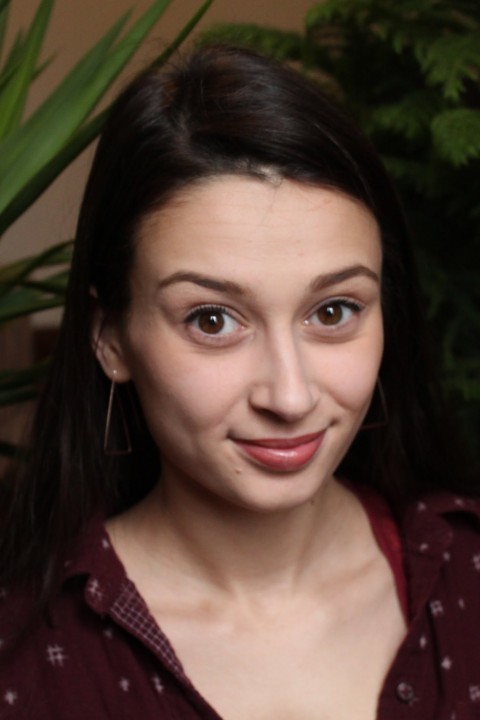
Her fascination with how humans think and communicate culminated in an eventual Ph.D. in psychology, focusing on cognition and multimodal communication through spoken language, sign language and gesture.
Her time as an instructor at UChicago has similarly spanned across many topics and disciplines, from teaching “Mind” in the social science Core to designing and overseeing a course called “'Human Communications” that explores the various ways humans create meaning through communication systems.
Ferrara's teaching philosophy is rooted in an experience she had as an undergraduate student, when one of her linguistics professors referred to her class as “linguists.”
"This seemingly innocuous choice instilled in me a sense of legitimacy and confidence in my ability to contribute something of value to the academic community," she said.
Now, as an instructor herself, she invites students to take themselves seriously as scholars and scientists, and hopes to instill confidence in them by doing so.
"In the classroom, I want students to see their questions as valuable and worth asking," she said. “All students bring with them a wealth of lived experience and are themselves members of communities and speakers of a language, and in my classes, students learn that the intuitions and ideas that arise from this are of value and can be examined and interrogated to reveal insights about how humans think and communicate.”
Taylor Hains, Ecology and Evolution
Taylor Hains teaches “Ecology in the Anthropocene” in the Ecology and Evolution department. His passion for nature and genomics shines through, fueling an innovative teaching approach that leaves a lasting impact on students: infusing levity and theater into the classroom experience.
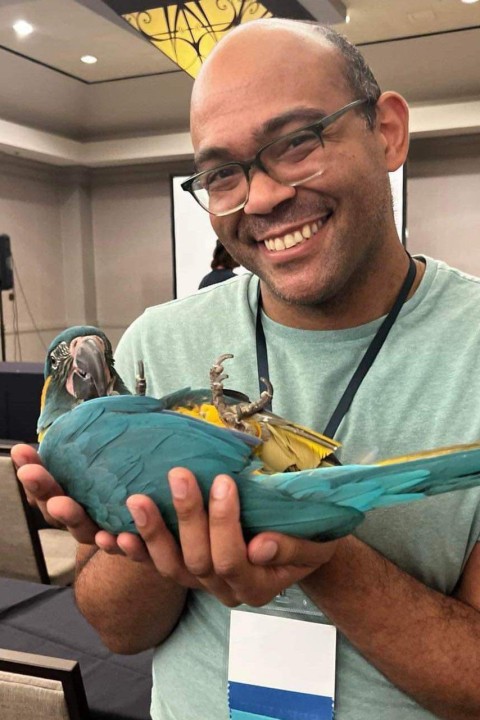
“I’ve always loved nature and wanted to make sure my scientific work helped society and preserve nature,” he said. “I think being able to connect the material to jokes allows for the students to remember the material a lot easier because they remember laughing.”
Hains is committed to creating an engaging and exciting learning environment, in which he consciously cultivates an atmosphere of curiosity.
He is also a proponent of making the extra effort to connect with his students on a personal level.
“The thing I learned from my own academic experiences is that if you’re going to be stuck in the classroom you might as well have fun,” he said. “I always tell my students that I am always here for you, do please don’t hesitate to email me if you need me. And, if you pass me on campus and don’t say hi, I will be very sad.”
Andrea Reed-Leal, Romance Languages & Literatures
To Andrea Reed-Leal, college classes are as much about creativity and enjoyment as they are about learning, and she brings that philosophy into her work teaching Spanish and Hispanic history and culture in the College.
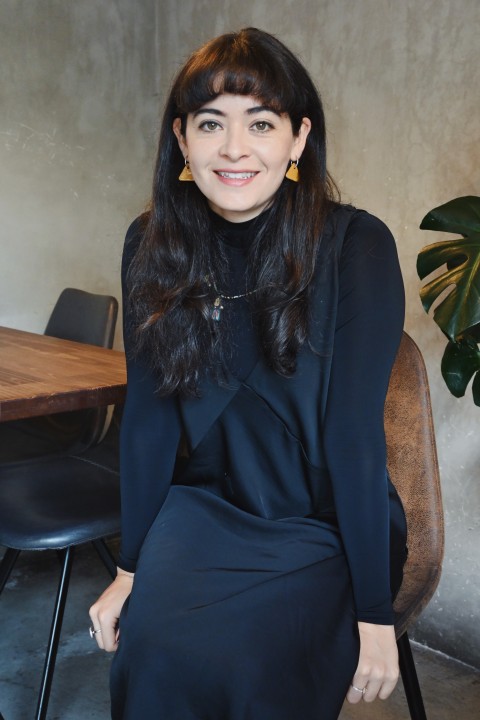
“One of the meanings of the Greek word skholè, the root of the Latin schola, means ‘leisure,’” Reed-Leal said. “The school is thus associated with enjoyment, joy and free time. The classroom should be a space of joyful learning, where everyone feels their voices are heard and included.”
Her approach to her instruction has been formed by the many years she spent teaching abroad, which exposed her to new ideas and cultures. Ultimately, she came to specialize in her particular field by working as a research assistant to anthropologist Lisa Overholtzer at McGill University, in Canada, who specializes in the everyday practices of ordinary people in Postclassic and Colonial Central Mexico.
Since Reed-Leal is a Ph.D. student, her teaching work is just as much about learning as it is about teaching others, an experience she says she has been privileged to experience at UChicago.
Along with the commitment and dedication of the UChicago students she teaches, Reed-Leal said she is proud of the communities that can form in the classroom, where she and her students can mutually support each other.
“I will always remember that the first time a professor came to observe one of my classes as part of my pedagogy training, I was very nervous – and I guess everyone could tell – I noticed my students were particularly patient and engaged, supporting me in moving through the class as we always did,” Reed-Leal said. “I read this as a gesture of ‘we have your back, Andrea!’ This made me realize that during the time we spend together in the classroom we not only exchange knowledge but create a sense of community.”
College Undergraduate Student Prize
Vincent Hou, Biology
A sequence of classes Vincent Hou took in his first year—“Molecular Biology of the Cell,” “Biological Systems” and “Biological Dynamics”—inspired him to pursue research in the life sciences. These courses, which are all part of the Advanced Biology sequence, are some of the most rigorous courses he has taken at the university. Now, he’s a lab TA for the very same sequence.
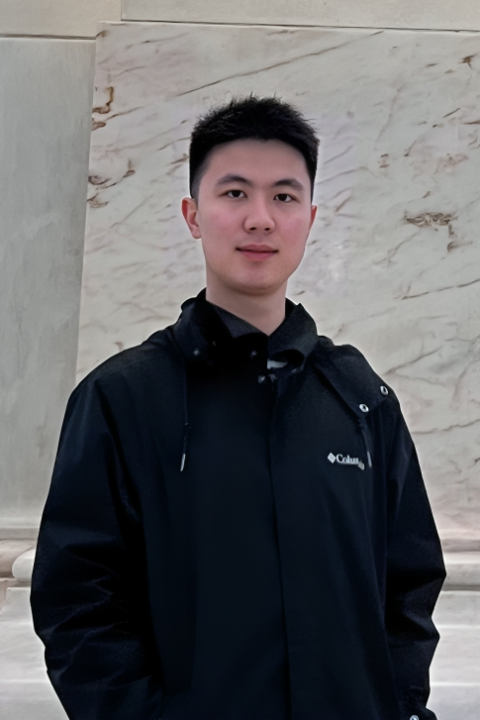
Hou often tells his students about the historical context of experimental technologies and the rationale for experimental design. By discussing his own research as well, he equips them to not only ask questions of what, but of why.
“Simply performing the labs according to the protocol without considering why these steps are performed is not very helpful for learning,” he said. “I hope this will make them better at designing studies of their own when they go into research themselves.”
A favorite memory of his from winter quarter is representative of the good times Hou seeks to bring to the lab. Hou recalled that he hadn’t had a haircut for months, so his students styled it into an “apple.”
“I directed the whole 4-hour fruit fly lab with it. This truly epitomizes the joy in my lab session,” he said. “You can see my smile through the mask!”
Hou is a biochemistry major and conducts research in a protein structure lab. Outside of his studies, he’s appreciative of the conversations he’s had with his peers, whom he always finds open-minded and unconstrained by practicality—he fondly remembers discussing Thomas Kuhn with an astrophysics major and an economics major.
As a TA since his second year, though, he’s not only well-versed in the life sciences, but in thinking like a scientist, too. This has lasted with him throughout his education.
“The main driving principle is to think before you act, especially in science,” he said.
Liam Pak, Economics
When Liam Pak began his collegiate experience, he was stuck abroad due to the COVID-19 pandemic, with an eight-hour time difference separating him from the students and professors in Chicago he shared Zoom classes with.
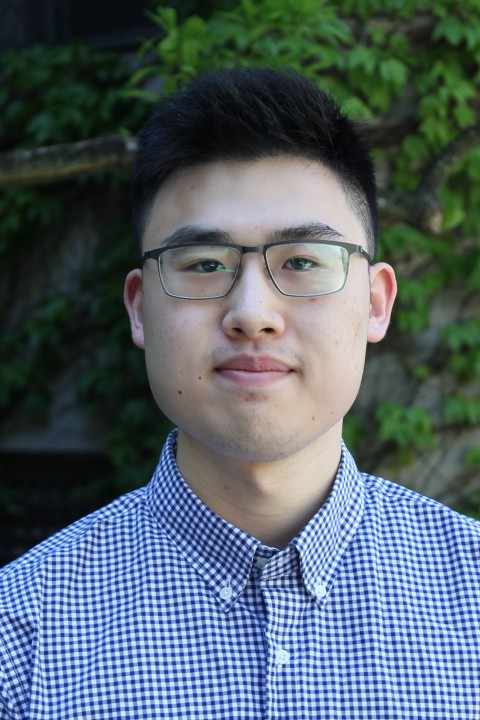
He said that the understanding and accommodation his professors offered him during this time is integral to his current approach as a teaching assistant, in which he tries to be as helpful and understanding as possible to his students.
Pak currently supports a course called “Managing in Organizations” which he has enjoyed both as a student and as a TA a year later.
"I was first interested in this class as I wanted to learn about how the likes of intuitions and unstructured experiences can deeply influence the effectiveness of managing a culture and individuals," he said.
Assisting Prof. Alexander Todorov as he taught the course again this past Winter Quarter allowed Pak to revisit some of the examples he had already found to be incredibly interesting the first time over, ranging from psychological experiments to space expeditions.
The theories Pak encountered as a student, and now helps teach as a TA, form the foundation for his favorite feature of the UChciago experience – the friendships formed during group work on projects and problem sets late at night.
“I remember a time when our group was working on homework which we began in the afternoon, thinking that we had all the time in the world. We ended up submitting one minute before the deadline! That is the sort of intense, shared working experience that really pulls a team together in a memorable way,” he said.
This and other activities like the 'Primal Scream,' another of Pak's fondest memories, emphasize the strong collaboration between students at UChicago that he finds to be particularly rewarding.
Laura Zielinski, Computer Science
Laura Zielinski took Honors Calculus on a whim as a first-year student, and found her academic passion by noticing the number of math tie-ins to computer science. Now as a TA for courses like “Formal Languages” and “Theory of Algorithms,” she has guided students through the theoretical underpinnings that tie the two disciplines together.
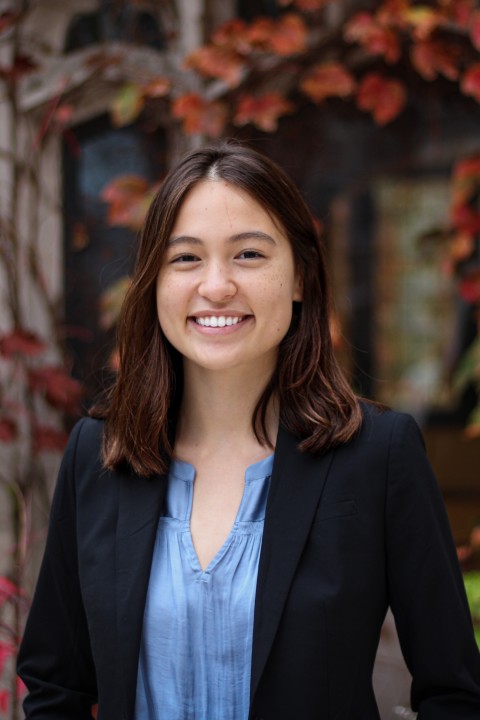
“I really liked being a TA for this “Algorithms” since I felt I could help computer science students with the math and proof-writing aspect, and maybe make them actually enjoy it,” she said.
Zielinski said that in the course of her education, she has learned that at least half of writing code or math proofs is making them readable and understandable. Writing skills correlate strongly with coding and proof-writing ability, so, surprising as it may be, writing clarity, organization, and argumentation are things she focuses on when teaching math and computer science students.
“The most important skill in every academic discipline is good, clear writing,” she said.
Next year, she is starting a Ph.D. in programming languages, a field of computer science that closely relates to math.
Even though algorithms (in this context, designing computer programs to solve hard problems) aren’t directly part of the field of programming languages, she said it is an extremely important branch of computer science theory that she is also interested in.
Some of Zielinski’s most cherished memories as a student include helping her friends move into their apartments at the beginning of every school year, jumping into Lake Michigan this January, and finishing second in the intramural Euchre tournament, she said.